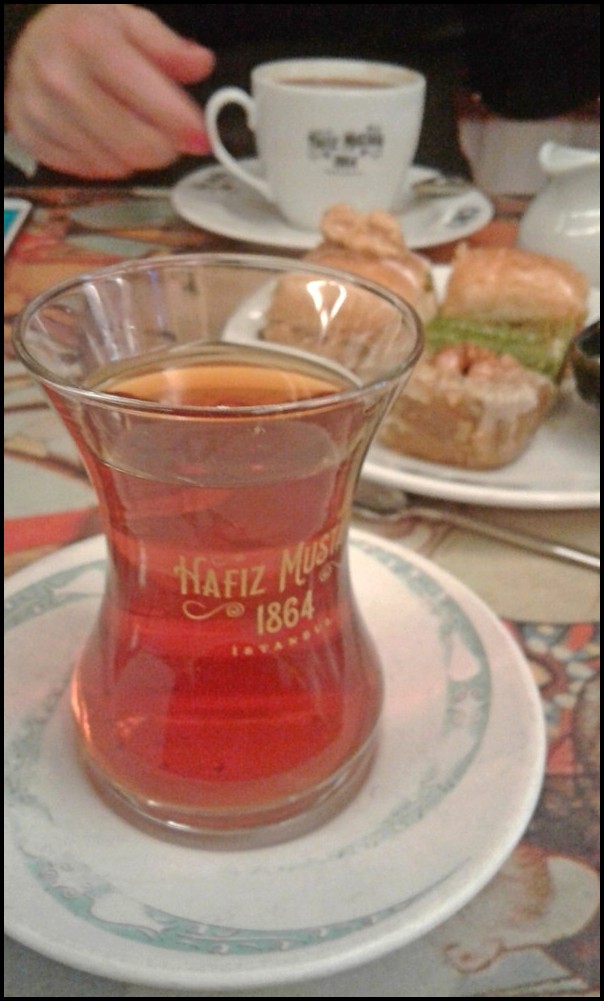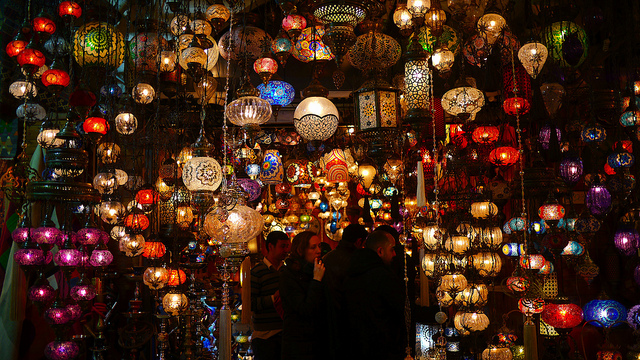
14 Observations about Turkish People
Ok, to start off this article, I must admit to being a bit hesitant to write these observations.
For one thing, everything I’m about to say is a result of my own personal observations of the Turks. So who knows, maybe I’m completely wrong? Or partly wrong?
But I do have at least some confidence it the accuracy of my observations. My tentative conclusions about the nature of Turkish people come from interacting with Turks for over one year. The people consist of friends, acquaintances, hotel owners & staff, shop owners & staff, neighbors, as well as strangers out in public.
What I’m about to talk about are manerisms, habits, traits, behaviors and attitudes I’ve observed over and over again by a majority of Turkish people I’ve come into contact with.
I know it’s not good, nor politically correct, to stereotype a group of people or nationality. However, if you hang out in any given country for a long period of time, you’re bound to notice some common national traits, habits, behaviors and attitudes, which to some extent ring true.
Things like the tendency of South East Asian and Hispanic cultures being rather laid-back and easy-going. Or the Germanic people generally being rather precise, disciplined and punctual.
Personally, in my long experiences out in the world, I’ve found such general ‘stereotypes’ to be mostly accurate.
Of course that isn’t to say that every single person in that country, culture or group is that way. But generally speaking, a majority of people in X country or culture tend to have such habits, traits and/or attitudes.
So at the risk of being accused of stereotyping the Turkish people, I offer the following observations that I’ve made about Turks in general.
As a disclaimer, I’d like to say to repeat that:
- These are my own personal observations, not facts set in stone. Who knows, I might even be wrong – partly or completely.
- I’m by no means claiming that every Turkish citizen has these behaviors, traits, attitudes or habits.
Finally, if any of you readers know more about any of the following points, or have contradictory observations, or understand the Turkish nature in more depth on any of these points, please feel free to pitch in or add to what I have to say here.
So at long last, here are my observations on Turkish people…
1. Turkish people offer outstanding hospitality
The Turks are great at making people feel warmly welcome. Whether guests are visiting a family home, a cafe or restaurant, a hotel or other accommodation, they are welcomed with warm smiles, greetings and an offer of tea, coffee or sweets.

2. Turks love to sit around drinking tea or coffee and chatting
From what I’ve observed, most Turks absolute favorite thing to do is sit around chatting while drinking a small cup of tea or coffee (or alcohol). They do this everywhere – in cafes, restaurants, bars, on sidewalks & at their homes; at small parks, beaches, forests, mountains; along rivers and canals.
They do this while strolling through parks, cycling, hiking in mountains, visiting museums, hanging out on beaches.
No matter where they go or with whom, their activities all seem to center around sipping tea or coffee and chatting.
3. Turkish people tend to speak very loudly
One of the first things I noticed when I arrived in Turkey for the first time is how loudly everyone talks. To me, they sound like they’re yelling. This goes for both men and women, children and teens and the elderly.
In addition, because of the way Turkish is pronounced & spoken in the upper back throat, the women in particular tend to yell in a very high-pitched kind of screeching talk, especially when they’re excited. And the men boom away in deeper yelling voices.
I really don’t understand this loud-volume talking habit, but it’s definitely part of Turkish culture.
I must point out, of course, that there are also more soft-spoken Turkish people as well.
4. Turks generally don’t play loud music
Interestingly, while Turks tend to talk very loudly, they generally don’t play music loudly. In fact, I generally don’t hear music played much at all. Out in public, nearly everyone uses headphones to listen to music or whatever programs they may be tuned into.
I also rarely hear music playing in stores, cafes, restaurants, hotels or public transportation. There are exceptions, but generally music isn’t part of the public environment. At least in the places and times of day that I’m out and about.
One big exception is on tour boats. On tour boats, they absolutely BOOM out loud lively music. It’s so incredibly loud that you can hear it from miles and miles away.
5. Turks love to smoke
The Turks are huge smokers! That goes for both men and women. I’d estimate that 80-90% of all adult Turks smoke, and heavily. In fact, it’s rare to meet a Turkish citizen who doesn’t smoke. Whenever I do meet a non-smoking Turk, I’m so surprised that I end up with my eyes popped out and my jaw dropped. Agape.
After spending nearly one full year in & around Turks, I know only four Turkish people who don’t smoke: one friend of mine, one receptionist at my hotel and one couple who have a small musical instrument store. That’s it.
The smokers tend to smoke inside: inside their houses, shops, hotels, restaurants and cafes. Even though it’s illegal to smoke inside any public venues, I often smell smoke inside small, privately-owned businesses and hotels. As I point out below, Turks tend to break rules. And smoking rules are definitely in the ‘ignore the rules’ category.
In fact, many small hotels still place ashtrays inside every guest room! Talk about encouraging indoor smoking!

6. Turkish people love the great outdoors – for socializing
Turkey is filled with stuning natural scenery of all kinds. There are beautiful mountains, seaside cliffs, long beaches, pretty pine forests, charming rivers, striking canyons and plenty of gorgeous city parks.
Turks have created some really spectacular outdoor restaurants, cafes, bars and beach clubs situated in the middle of stunning natural landscapes. And many Turkish people spend a lot of their free time out in nature. But it seems to all be about socializing!
In cities, this makes perfect sense to me. But out in nature, I’ve been repeatedly astounded at Turks’ version of ‘enjoying nature’.
At beaches, they tend to get into the sea close to shore then stand there and chat. Or else they’ll move around in the water while chatting with friends. Or they’ll slowly swim together out to a buoy (while chatting) and then hang out on the buoy talking.
In forests, mountains and city parks, they usually take along folding chairs, a folding table or large cloth, a thermos of tea or coffee and some snacks. They’ll find a spot they like, then set everything up, then sit down and proceed spending an hour or two or three chatting.
Some people sit on park benches to drink & chat, or else stroll slowly along pathways while chatting.
But I rarely see any Turks actually purely ‘enjoying nature’ in the manner I understand it, which is to quietly hike through the forest / mountains / parks while admiring the trees, flowers, bird songs, coastal views, flowing water and so on. In fact, I rarely see anyone actually notice the stunning nature around them. They simply sit in a natural location while conversing.

7. Turks generally don’t swim
In 2020 I spent 5 ½ months on Turkey’s stunning Mediterranean coast, mostly in Antalya and Fetiye, as well as the spectacular stretch of coastline between these two main cities.
From June through mid-September, I visited one beach or the other almost daily. Some days I was simply walking or cycling past the beaches. Other days I was hanging out for several hours, suntanning and swimming in the vibrant turquiose-colored sea.
I spent a full 3 ½ months observing people at about a dozen different beaches. And one thing I noticed rather quickly and continued observing was the fact that Turks generally don’t swim, despite the fact that many, many Turkish people I met told me that they love swimming.
But they don’t actually swim. Instead, as I detailed above, they get in the water then stand around chatting. Or they move slowly through the water while talking with friends. It’s an odd thing, that. I can’t really say they’re swimming as they don’t use any visible arm strokes or leg kicks. And they remain in a vertical position while they’re moving through the water, chatting. So they must be doing some sort of doggy paddle.
What Turkish people mean by ‘swimming’ is getting into the water then standing or moving around chatting.
I did occasionally observe a person here and there take a break from chatting with their companions and attempt to swim. Usually a young guy. The result usually showed that they actually didn’t really know how to swim correctly. They’d attempt some basic strokes, and travel it some distance, but in an awkward manner and with lots of splashing about.
However, I will also point out that there are a minority group of Turkish people who are, indeed, very good swimmers. Excellent swimmers, in fact. Most are older Turks, mostly men. And often in groups, so perhaps a swim club? I’ve seen them making long distance swims off the coast of Antalya and Fetiye. Now those Turks know how to swim!

8. Turkish people are tremendous litter-ers
While Turkish people love to frequent their beautiful natural places – parks, beaches, forests and mountains (mostly to sit, eat & drink and socialize) – quite unfortunately, they usually leave behind them a huge mess of trash.
Last year I was ‘stuck’ in Antalya for over two months during Covid-19 lockdown. I was still there when some parks began opening. After the very first open day, I was shocked to find the normally sparkling-clean city parks that I loved suddenly filled with heaps of cigarette butts and bags full of trash.
I also always came across huge piles of trash every time I cycled out into the mountains, forests and streams on the outskirts of the city. Beaches, too, are littered with cigarette butts.
It’s one unfortunate Turkish habit.

9. Turks tend to be laid-back and easy-going
Turks generally seem to be soft, gentle, avoiding conflict with people. They’re easy-going, flexible and quite laid-back. They generally are not uptight, rigid or strict. Everything seems to be flexible.
Depending on the situation, this can be a great thing or a difficult thing. For getting along with people this generally works quite well. But if you need precise information, such as bus schedules, you could have problems getting what you need. In fact, they quickly get annoyed if you start asking detail-oriented questions and will generally just stop talking to you.
Turks generally are not precise or detail-oriented.

10. Turks have a tendency to bend – or break – rules
This is something I noticed right away and have continued noting on a daily basis about the Turks. Some obvious examples surround smoking rules. While it’s illegal to smoke inside hotels, hotel rooms, restaurants, cafes and, in fact, any public places, still plenty of Turks smoke inside all those places.
Other glaring examples have come out during the Covid pandemic. For instance, this year the national rule is that children and anyone under 20 years of age can go out in public only during the hours of 1-4 pm.
I walk through city parks almost every morning. Every day I see people out with babies, infants and children starting at 11 am, sometimes even 10 am. They seem to completely ignore the regulations, just taking their kids out whenever it suits them.
11. Turks also tend to not enforce rules & regulations
Quite oddly to me, Turkish police and security guards generally do not enforce the rules!
I can’t tell which came first – or if one is the result of the other – Do people break the rules because they know the police won’t bust them? Or do police not enforce the rules because they know it would be too much hassle trying to crack down on so many people all the time?

12. Most Turks are very laid-back Muslims
The Turks’ general laid-back, easy-going attitude extends to their religious practices as well. Most Turks do not pray five times a day, do not stop what they’re doing when the daily mosque calls to prayer sound out, do not visit mosques weekly and don’t carry around prayer beads.
Drinking alcohol is very popular, even the norm, in Turkey. Turkish women readily wear bikinis at beaches. Super short skirts and sleeveless tops are also very popular for nights out.
Of course there are also plenty of devout Turkish Muslims, too, and entire sections of the country that follow much stricter Islamic practices. But most people in the main cosmopolitan cities and Mediterranean / Aegean coastal regions are pretty laid back with religious practices.

13. Turkish people are extremely hygienic
Islam strongly promotes personal hygiene. And in the case of visiting mosques, it requires that mosque-goers first cleanse their faces & hands, and often their feet, before entering the mosque. The outer courtyards of mosques, therefore, have special fountains for people to do so. Some such courtyards have dozens of cleansing stations, complete with individual fountains, dipping bowls and small stools to sit on. Mosque bathrooms (and some public ones) have a separate room for cleaning the hands, feet and face.
Although many Turks have laid-back religious practices in many regards, this is one religious principle they do head. As a result of this deeply-ingrained religious hygiene protocols, Turks are extremely hygienic in their daily lives, not just when visiting mosques.

14. Turks are not thieves
Islam has a very strong taboo against theft. As a result, most predominantly-Islamic countries, such as Turkey, are virtually theft-free. That’s an ‘almost’. Unfortunately, there are some places in Turkey where a bit of pickpocketing or theft does take place (such as prime tourist attractions in major cities).
But for the most part, in Turkey people do not have to worry about their possessions being stolen. Not at a restaurant or cafe, not in hotel rooms or lobbies, nor on buses or trolleys.
Turkey is also one country where you can usually leave your things on a public beach and go for a swim without worrying at all about your possessions going missing (including money, phones and other valuables). I’m sure there must be some exceptions to this rule, somewhere at some ultra-popular beach or other. But all the beaches I’ve enjoyed were perfectly safe.
You might also enjoy:
12 Things I Most Love about Turkey
Why Istanbul is an Easy Travel Destination
====================================












 Hi! I'm Lash, an American nomadic world traveler who's been traveling solo since 1998. I’m passionate about traveling the world nomadically and then sharing it all with you. I hope to inspire you to travel the world, to entertain you with tales from the road, and to help you reach your travel dreams. Welcome!
Hi! I'm Lash, an American nomadic world traveler who's been traveling solo since 1998. I’m passionate about traveling the world nomadically and then sharing it all with you. I hope to inspire you to travel the world, to entertain you with tales from the road, and to help you reach your travel dreams. Welcome! 



